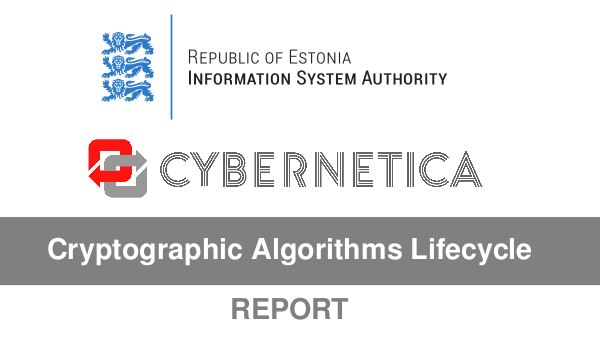
This study is a natural continuation of three previous studies conducted in 2011, 2013 and 2015. The fourth version of cryptographic algorithms life cycle study published on June 9, has more than 10 authors and has 163 reference source. The 2016 report is the first one in its sequence to be written in English, because the study is unique on a global scale, and the previous versions has been of great international interest.
The foreword of the report has been written by Anto Veldre:
The Dutch DigiNotar case in 2011 demonstrated the hard choices a country faces if a PKI supporting its government’s IT systems is compromised. [..] Therefore, it was decided in 2011 to assemble a scientific task force to analyse the problems and risks that reliance on cryptography is posing on the sustainable functioning of our society.
Among the usual topics in cryptography, there is quite revealing section “Cryptographic protocols over radio connection”. For example, there the authors find that Estonian public transportation cards are vulnerable to various kinds of Denial of Service and cloning attacks:
The transportation cards in Tallinn are built on MIFARE Classic, whereas in Tartu MIFARE Ultralight C cards are used. However, even though both of the cards support cryptographic authentication, this functionality is not used. In both cases, the protocol running between the card and the reader is essentially the same, consisting of transmitting the card’s unique ID and a signature. [..] While this measure prevents unauthorised parties from issuing new cards, it does not stop the card cloning attack. [..] Cloning a card that carries a monthly ticket causes direct financial loss to the transportation service provider and must hence be urgently addressed.
Even though the ID fields of transportation cards are not writeable, other fields may be. This is for example the case with Tartu bus cards that allow e.g. the signature field to be overwritten by a standard app working on a regular NFC-capable smartphone. As a result, the card will become invalid, giving us a potential Denial of Service attack.
The report analyzes different radio frequency card technologies used for physical access control. There are many problems – transparency issues, use of weak cryptography or no cryptography at all. The authors have also interviewed Hardmeier and G4S to study deployment issues. Some of the deployment issues revealed are quite disturbing:
Interview with a company installing NFC-based access control systems revealed that it is common practice to use same keys also in several installations, making e.g. door keys of one company work at the door of another company, too.
Links:
https://www.ria.ee/public/RIA/Cryptographic_Algorithms_Lifecycle_Report_2016.pdf
https://www.ria.ee/ee/eriik-2018-valmis-2016-aasta-kruptograafiliste-algoritmide-elutsukli-uuring.html
https://blog.ria.ee/ria-aastakonverentsi-i-sessiooni-otseblogi/